人教版九年级全册Unit 12 Life is full of the unexpected Section B 1课件(共35张PPT,内嵌音频 )
文档属性
| 名称 | 人教版九年级全册Unit 12 Life is full of the unexpected Section B 1课件(共35张PPT,内嵌音频 ) |  | |
| 格式 | pptx | ||
| 文件大小 | 12.8MB | ||
| 资源类型 | 教案 | ||
| 版本资源 | 人教新目标(Go for it)版 | ||
| 科目 | 英语 | ||
| 更新时间 | 2023-07-14 11:28:27 | ||
图片预览

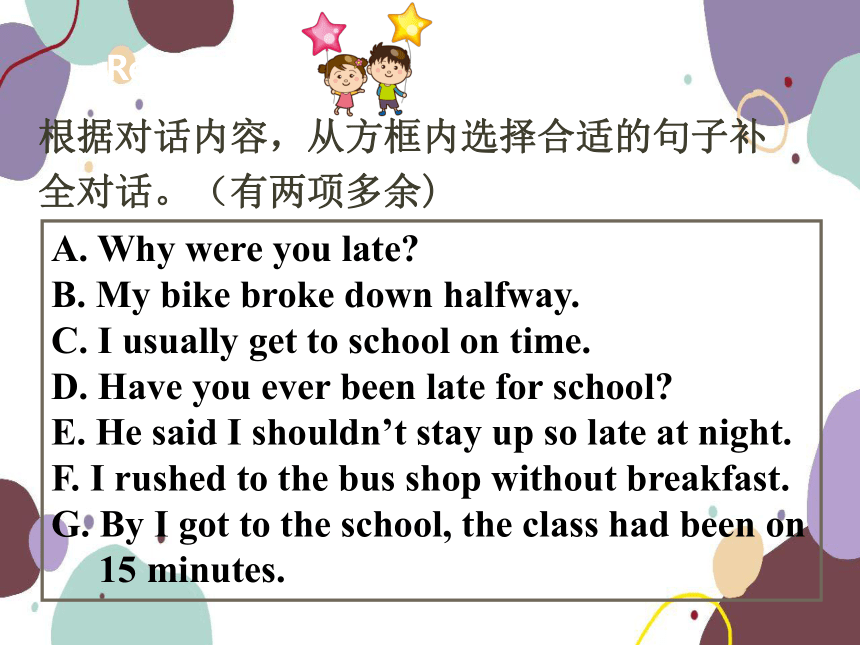
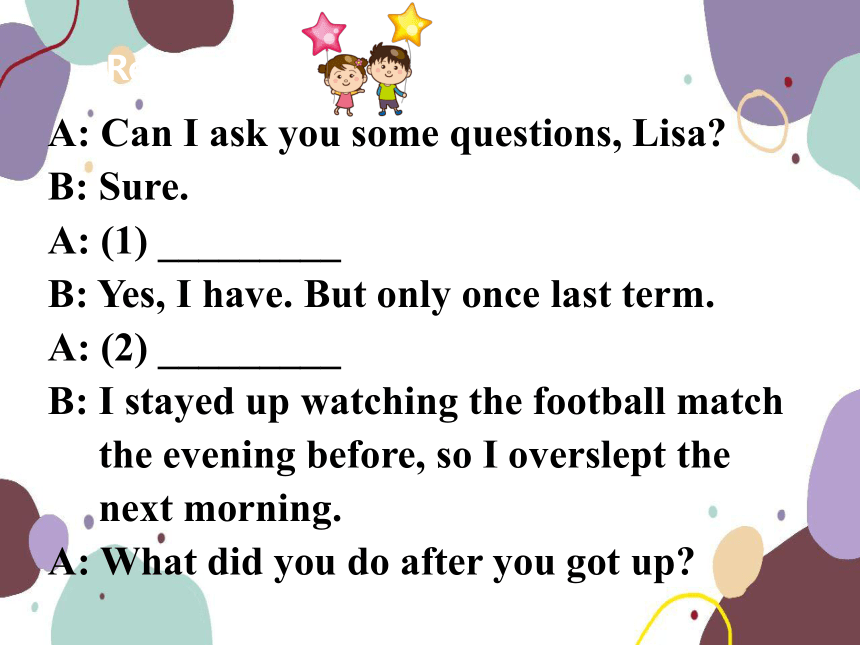
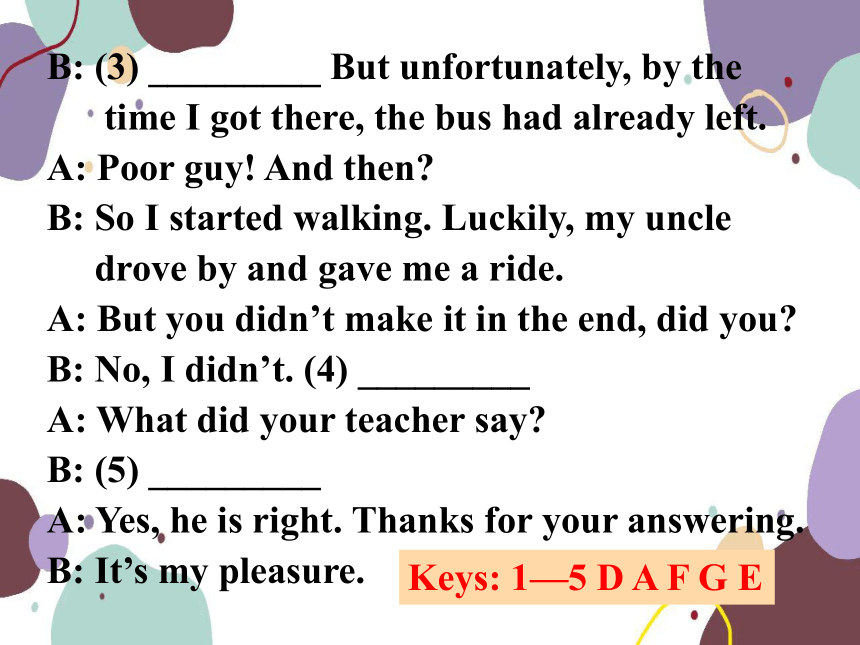
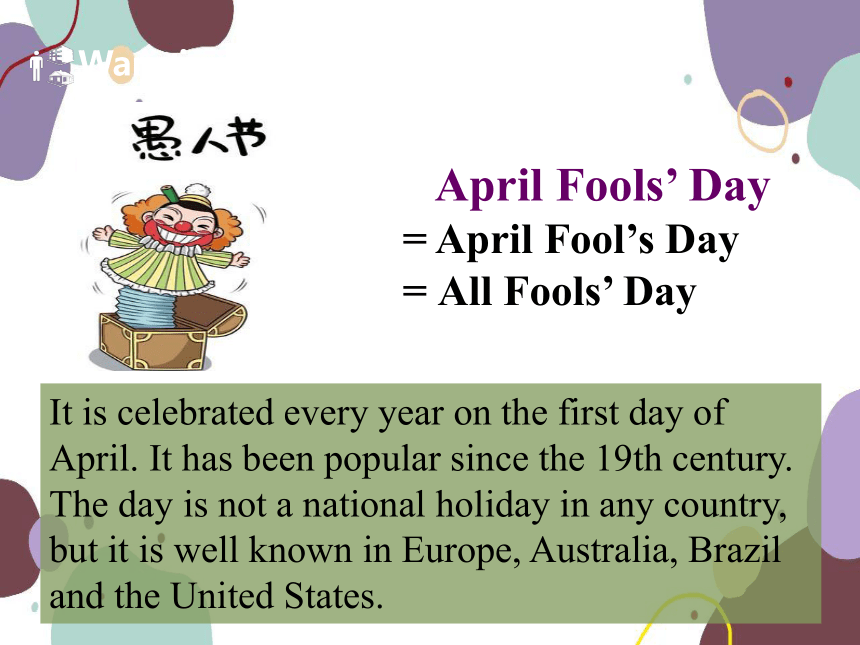
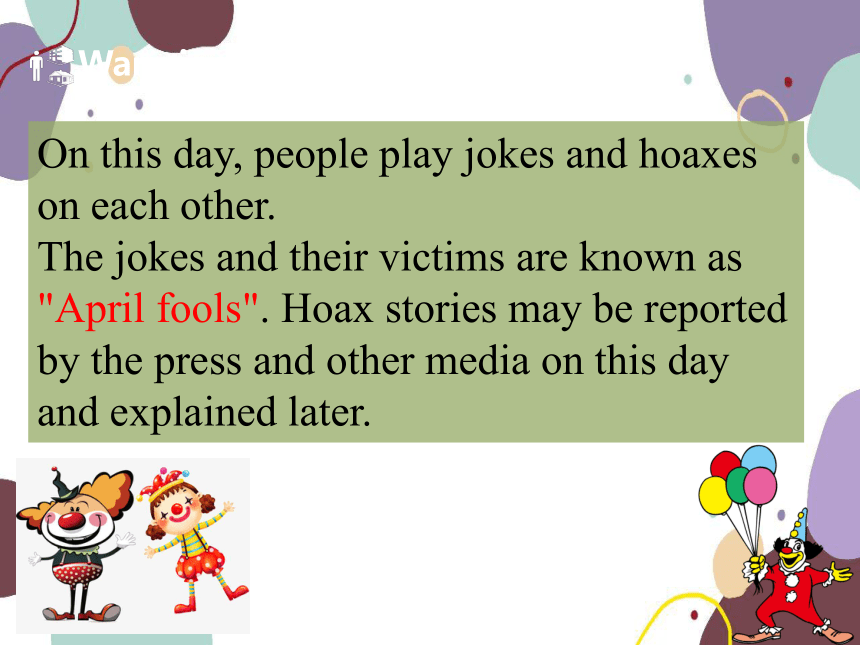
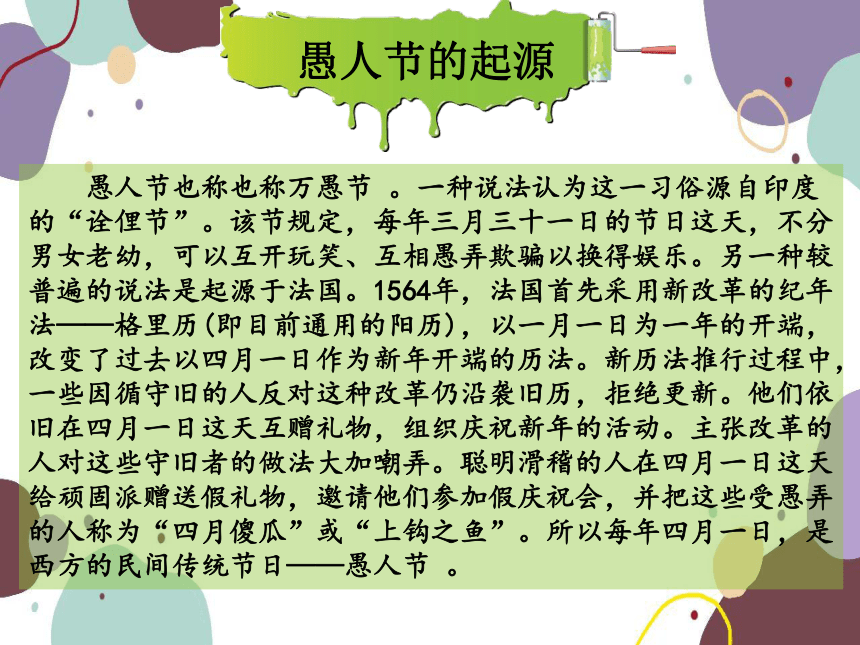
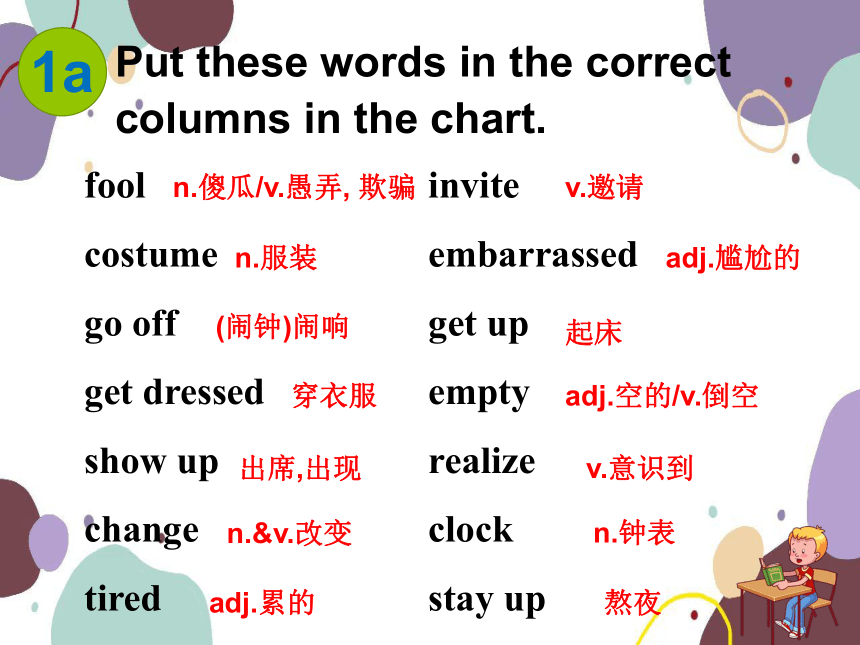
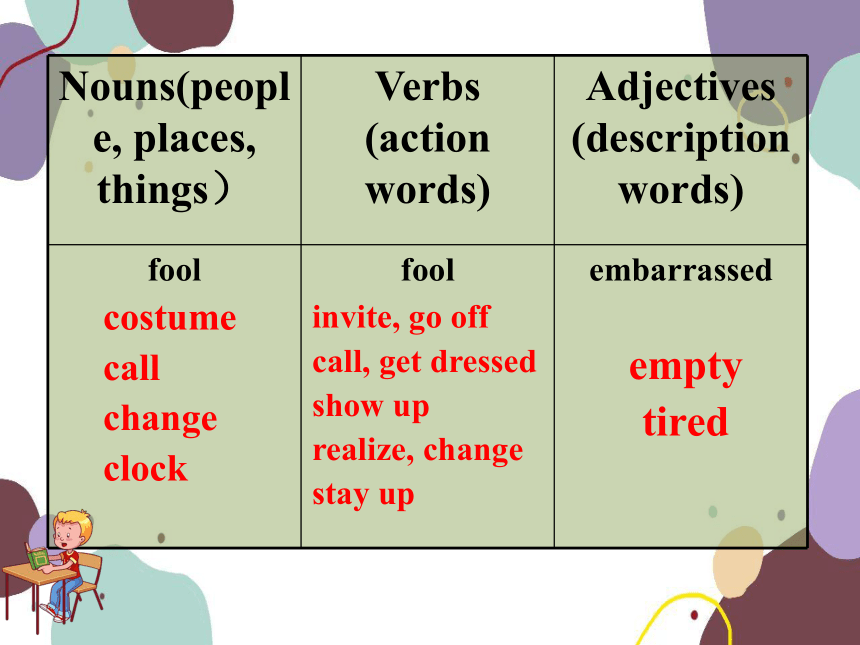
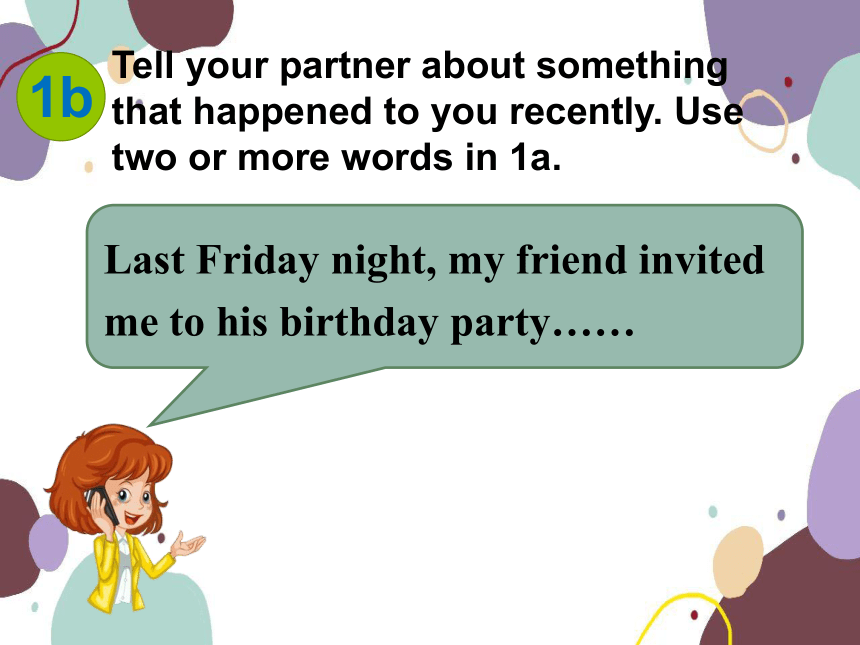
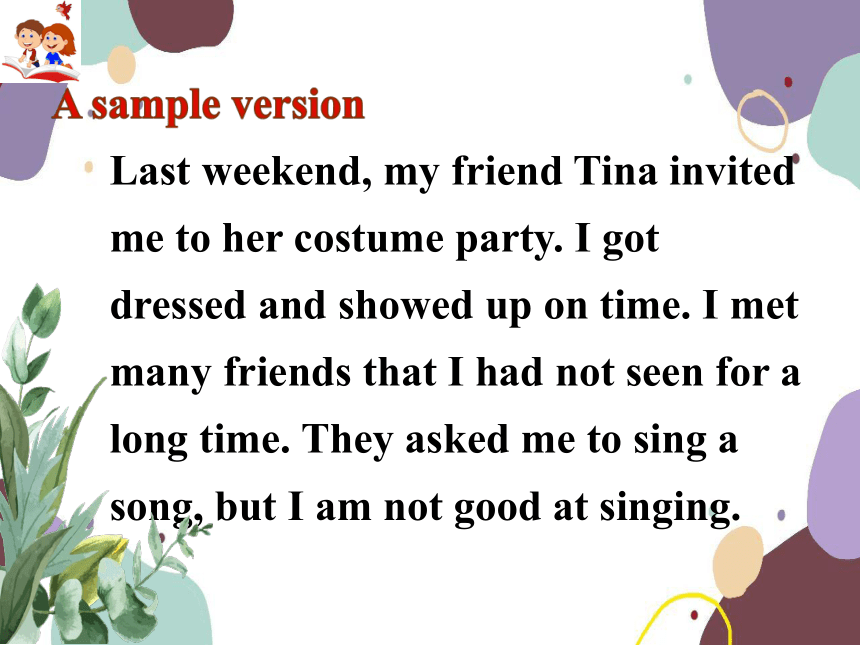
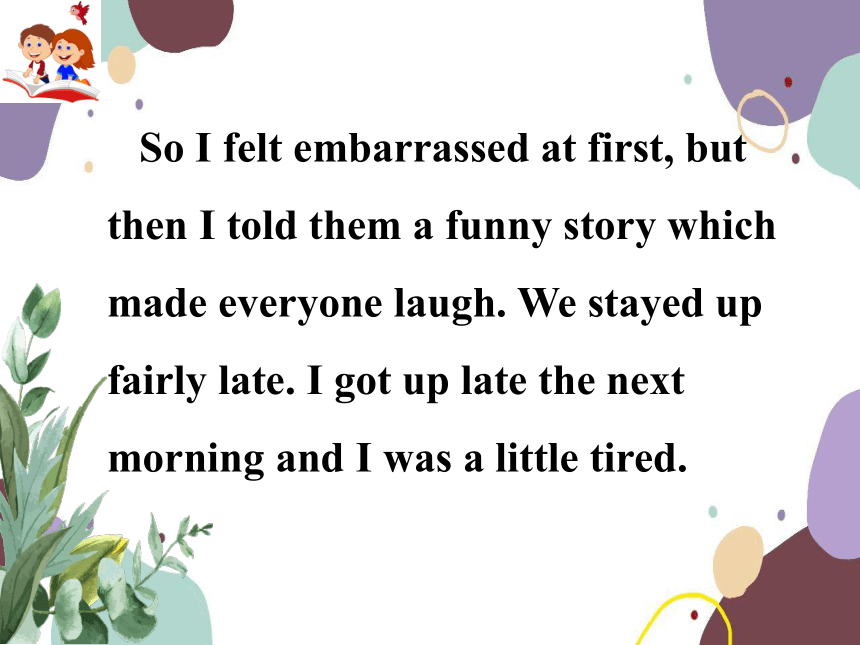
文档简介
(共35张PPT)
九年级英语下册(RJ)教学课件
Unit 12
Life is full of the unexpected.
Section B
1a-2e
Revision
根据对话内容,从方框内选择合适的句子补全对话。(有两项多余)
A. Why were you late
B. My bike broke down halfway.
C. I usually get to school on time.
D. Have you ever been late for school
E. He said I shouldn’t stay up so late at night.
F. I rushed to the bus shop without breakfast.
G. By I got to the school, the class had been on
15 minutes.
Revision
A: Can I ask you some questions, Lisa
B: Sure.
A: (1) _________
B: Yes, I have. But only once last term.
A: (2) _________
B: I stayed up watching the football match
the evening before, so I overslept the
next morning.
A: What did you do after you got up
B: (3) _________ But unfortunately, by the
time I got there, the bus had already left.
A: Poor guy! And then
B: So I started walking. Luckily, my uncle
drove by and gave me a ride.
A: But you didn’t make it in the end, did you
B: No, I didn’t. (4) _________
A: What did your teacher say
B: (5) _________
A: Yes, he is right. Thanks for your answering.
B: It’s my pleasure.
Keys: 1—5 D A F G E
Warming up
It is celebrated every year on the first day of
April. It has been popular since the 19th century.
The day is not a national holiday in any country,
but it is well known in Europe, Australia, Brazil
and the United States.
April Fools’ Day
= April Fool’s Day
= All Fools’ Day
Warming up
On this day, people play jokes and hoaxes
on each other.
The jokes and their victims are known as
"April fools". Hoax stories may be reported by the press and other media on this day and explained later.
愚人节的起源
愚人节也称也称万愚节 。一种说法认为这一习俗源自印度的“诠俚节”。该节规定,每年三月三十一日的节日这天,不分男女老幼,可以互开玩笑、互相愚弄欺骗以换得娱乐。另一种较普遍的说法是起源于法国。1564年,法国首先采用新改革的纪年法——格里历(即目前通用的阳历),以一月一日为一年的开端,改变了过去以四月一日作为新年开端的历法。新历法推行过程中,一些因循守旧的人反对这种改革仍沿袭旧历,拒绝更新。他们依旧在四月一日这天互赠礼物,组织庆祝新年的活动。主张改革的人对这些守旧者的做法大加嘲弄。聪明滑稽的人在四月一日这天给顽固派赠送假礼物,邀请他们参加假庆祝会,并把这些受愚弄的人称为“四月傻瓜”或“上钩之鱼”。所以每年四月一日,是西方的民间传统节日——愚人节 。
1a
Put these words in the correct columns in the chart.
fool invite
costume embarrassed
go off get up
get dressed empty
show up realize
change clock
tired stay up
v.邀请
n.服装
adj.尴尬的
(闹钟)闹响
起床
穿衣服
出席,出现
v.意识到
n.钟表
熬夜
n.傻瓜/v.愚弄, 欺骗
adj.空的/v.倒空
n.&v.改变
adj.累的
Nouns(people, places, things) Verbs (action words) Adjectives
(description words)
fool fool embarrassed
invite, go off
call, get dressed
show up
realize, change
stay up
costume
call
change
clock
empty
tired
Tell your partner about something that happened to you recently. Use two or more words in 1a.
1b
Last Friday night, my friend invited me to his birthday party……
A sample version
Last weekend, my friend Tina invited me to her costume party. I got dressed and showed up on time. I met many friends that I had not seen for a long time. They asked me to sing a song, but I am not good at singing.
So I felt embarrassed at first, but then I told them a funny story which made everyone laugh. We stayed up fairly late. I got up late the next morning and I was a little tired.
1c
Dave, Nick and Joe are talking about April Fool’s Day. Listen and write each person’s name under the correct picture.
No name
Dave
Joe
Nick
Listen again. Who says each of the phrases below Write D for Dave, N for Nick and J for Joe.
1.______ a costume party
2.______ my alarm went off
3.______ stayed up all night
4. ______ was exhausted
5. ______ really embarrassed
6. ______ the other kids showed up
D
N
J
J
D
N
1d
1e
Tell April Fool’s Day stories in your group. Use the information in 1c and 1d.
A: What happened to Dave on April Fool’s Day
B: Well, a friend invited him to a costume party, ….
Group work
Practice
2a
Have you ever played jokes on others, especially on Aril Fool’s Day Have you ever been fooled by others Tell your story to your partner.
2b
Read the passage quickly. Match
each paragraph with the main idea.
Paragraph 1
Paragraph 2
Paragraph 3
Paragraph 4
◆ The most famous trick played
◆ Examples of funny stories that happened on April Fool’s Day.
◆ An introduction to April Fool’s Day
◆ A sad story that happened on April Fool’s Day
Fast reading
2c
Read the passage carefully and answer these questions.
Why did the supermarkets run out of
spaghetti one April Fool’s Day
Because a reporter announced that there would be no more spaghetti as spaghetti farmers in Italy had stopped growing spaghetti.
What did the TV show say that the special water could do
It was said that the special water would help people lose weight.
Why did the TV star’s joke have a bad ending
Because he lost both his girlfriend and his show.
4. When did Orson Welles tell people about aliens from Mars landing on the earth
It was in October 1938.
5. Why did so many people believe Orson Welles
Because Orson Welles made it sound so real that hundreds of people believed the story.
Which of these stories is the most believable
Which is the least believable Why
I think…
Because…
Would you be fooled by any of these stories
Yes, I would. Because…
No, I wouldn’t. Because…
2d
Fill in the blanks with the correct forms of the verbs in brackets.
1. After the spaghetti story __________
(appear) in the news, everyone _______
(rush) to the supermarkets.
2. By the time people ________ (find out)
the story was not true, all the spaghetti
in the supermarkets _______________
(disappear).
appeared
rushed
found out
had disappeared
3. By the time the day ______ (end), more
than 10,000 people _________ (call) the
TV station to ask about the special water.
4. By the time the show _____ (end), the TV star ________ (lose) his girl friend.
5. By the time police officers ____ (tell)
the country that the story was a hoax,
many people ____________ (run away)
from their homes.
ended
had called
ended
had lost
told
had run away
Post reading
2e
Tell your funny story from 2a to the class. The class will vote for:
a. the funniest joke
b. the most embarrassing joke
c. the most creative joke
A: What’s your story
B: Well, last year, on the first day of school,
my sister put a piece of paper on my
back that said “Please say hello.” All
morning at school ...
Language points
1. fool n. 傻瓜;愚人;受骗者
vt. 愚弄,欺骗;
e.g. He was fooled by his friend on
April Fool’s Day.
愚人节那天他被他的朋友愚弄了。
2. embarrassed adj. 局促不安的;为难的;
尴尬的;窘迫的
e.g. He looked a bit embarrassed.
他看起来有点尴尬。
embarrassing adj. 使人尴尬的,
令人为难的
e.g. That was an embarrassing situation
for me.
那种情形让我难堪。
3. sell out 卖完;售完;出售
e.g. The next day the bookshops sold out.
第二天书店就卖断了货。
4. discovery n. 发现,发觉;(剧情的)
发展;被发现的事物
e.g. He knows that he had made a real
discovery.
他知道他已经发现了一件真正的珍
品。
5. marry v. “嫁,娶,结婚”
e.g. Henry didn’t marry until he was
over fifty.
亨利直到过了50岁才结婚。
(1) marry sb. 表示“嫁给某人”、“娶了某
人”或“和某人结婚”
(2) get/be married to sb.
e.g. John is going to marry Jane.
约翰要和简结婚了。
6. The other kids showed up.
show up 露面,到场; (使)看得见
e.g. We waited until five o’clock, but he
did not show up.
我们一直等到了5点,但是他始终没有露面。
7. Many April Fool’s jokes may end up being not very funny.
end up (doing sth.)(以…)结束;最终成为;最后处于
e.g. Every time she tried to argue with
her husband, she ended up crying
her eyes out.
每回她试着和她丈夫争辩,她总是
以流泪结束。
①end up sth. 表示“结束某事”。
e.g. The scientist ended up his speech at
last.
那个科学家最后结束了演讲。
②end up with sth. (以……)结束
e.g. The students began with speaking
English, but ended up with speaking
Chinese.
同学们以说英语开始,却以说汉语结
束。
Exercises
根据汉语意思完成英语句子。
1.记者刚刚结束了他的报道。
The reporter has just _________________.
2. 聚会以一曲舞蹈结束。
The party ______________ a dance.
3. 他们做了很多工作,结果什么也没得到。
They did much work, but they
________________ nothing.
ended up his report
ended up with
ended up getting
3.Complete the student’s book lessons.
1. Finish your composition.
2. Review the whole unit.
Homework
九年级英语下册(RJ)教学课件
Unit 12
Life is full of the unexpected.
Section B
1a-2e
Revision
根据对话内容,从方框内选择合适的句子补全对话。(有两项多余)
A. Why were you late
B. My bike broke down halfway.
C. I usually get to school on time.
D. Have you ever been late for school
E. He said I shouldn’t stay up so late at night.
F. I rushed to the bus shop without breakfast.
G. By I got to the school, the class had been on
15 minutes.
Revision
A: Can I ask you some questions, Lisa
B: Sure.
A: (1) _________
B: Yes, I have. But only once last term.
A: (2) _________
B: I stayed up watching the football match
the evening before, so I overslept the
next morning.
A: What did you do after you got up
B: (3) _________ But unfortunately, by the
time I got there, the bus had already left.
A: Poor guy! And then
B: So I started walking. Luckily, my uncle
drove by and gave me a ride.
A: But you didn’t make it in the end, did you
B: No, I didn’t. (4) _________
A: What did your teacher say
B: (5) _________
A: Yes, he is right. Thanks for your answering.
B: It’s my pleasure.
Keys: 1—5 D A F G E
Warming up
It is celebrated every year on the first day of
April. It has been popular since the 19th century.
The day is not a national holiday in any country,
but it is well known in Europe, Australia, Brazil
and the United States.
April Fools’ Day
= April Fool’s Day
= All Fools’ Day
Warming up
On this day, people play jokes and hoaxes
on each other.
The jokes and their victims are known as
"April fools". Hoax stories may be reported by the press and other media on this day and explained later.
愚人节的起源
愚人节也称也称万愚节 。一种说法认为这一习俗源自印度的“诠俚节”。该节规定,每年三月三十一日的节日这天,不分男女老幼,可以互开玩笑、互相愚弄欺骗以换得娱乐。另一种较普遍的说法是起源于法国。1564年,法国首先采用新改革的纪年法——格里历(即目前通用的阳历),以一月一日为一年的开端,改变了过去以四月一日作为新年开端的历法。新历法推行过程中,一些因循守旧的人反对这种改革仍沿袭旧历,拒绝更新。他们依旧在四月一日这天互赠礼物,组织庆祝新年的活动。主张改革的人对这些守旧者的做法大加嘲弄。聪明滑稽的人在四月一日这天给顽固派赠送假礼物,邀请他们参加假庆祝会,并把这些受愚弄的人称为“四月傻瓜”或“上钩之鱼”。所以每年四月一日,是西方的民间传统节日——愚人节 。
1a
Put these words in the correct columns in the chart.
fool invite
costume embarrassed
go off get up
get dressed empty
show up realize
change clock
tired stay up
v.邀请
n.服装
adj.尴尬的
(闹钟)闹响
起床
穿衣服
出席,出现
v.意识到
n.钟表
熬夜
n.傻瓜/v.愚弄, 欺骗
adj.空的/v.倒空
n.&v.改变
adj.累的
Nouns(people, places, things) Verbs (action words) Adjectives
(description words)
fool fool embarrassed
invite, go off
call, get dressed
show up
realize, change
stay up
costume
call
change
clock
empty
tired
Tell your partner about something that happened to you recently. Use two or more words in 1a.
1b
Last Friday night, my friend invited me to his birthday party……
A sample version
Last weekend, my friend Tina invited me to her costume party. I got dressed and showed up on time. I met many friends that I had not seen for a long time. They asked me to sing a song, but I am not good at singing.
So I felt embarrassed at first, but then I told them a funny story which made everyone laugh. We stayed up fairly late. I got up late the next morning and I was a little tired.
1c
Dave, Nick and Joe are talking about April Fool’s Day. Listen and write each person’s name under the correct picture.
No name
Dave
Joe
Nick
Listen again. Who says each of the phrases below Write D for Dave, N for Nick and J for Joe.
1.______ a costume party
2.______ my alarm went off
3.______ stayed up all night
4. ______ was exhausted
5. ______ really embarrassed
6. ______ the other kids showed up
D
N
J
J
D
N
1d
1e
Tell April Fool’s Day stories in your group. Use the information in 1c and 1d.
A: What happened to Dave on April Fool’s Day
B: Well, a friend invited him to a costume party, ….
Group work
Practice
2a
Have you ever played jokes on others, especially on Aril Fool’s Day Have you ever been fooled by others Tell your story to your partner.
2b
Read the passage quickly. Match
each paragraph with the main idea.
Paragraph 1
Paragraph 2
Paragraph 3
Paragraph 4
◆ The most famous trick played
◆ Examples of funny stories that happened on April Fool’s Day.
◆ An introduction to April Fool’s Day
◆ A sad story that happened on April Fool’s Day
Fast reading
2c
Read the passage carefully and answer these questions.
Why did the supermarkets run out of
spaghetti one April Fool’s Day
Because a reporter announced that there would be no more spaghetti as spaghetti farmers in Italy had stopped growing spaghetti.
What did the TV show say that the special water could do
It was said that the special water would help people lose weight.
Why did the TV star’s joke have a bad ending
Because he lost both his girlfriend and his show.
4. When did Orson Welles tell people about aliens from Mars landing on the earth
It was in October 1938.
5. Why did so many people believe Orson Welles
Because Orson Welles made it sound so real that hundreds of people believed the story.
Which of these stories is the most believable
Which is the least believable Why
I think…
Because…
Would you be fooled by any of these stories
Yes, I would. Because…
No, I wouldn’t. Because…
2d
Fill in the blanks with the correct forms of the verbs in brackets.
1. After the spaghetti story __________
(appear) in the news, everyone _______
(rush) to the supermarkets.
2. By the time people ________ (find out)
the story was not true, all the spaghetti
in the supermarkets _______________
(disappear).
appeared
rushed
found out
had disappeared
3. By the time the day ______ (end), more
than 10,000 people _________ (call) the
TV station to ask about the special water.
4. By the time the show _____ (end), the TV star ________ (lose) his girl friend.
5. By the time police officers ____ (tell)
the country that the story was a hoax,
many people ____________ (run away)
from their homes.
ended
had called
ended
had lost
told
had run away
Post reading
2e
Tell your funny story from 2a to the class. The class will vote for:
a. the funniest joke
b. the most embarrassing joke
c. the most creative joke
A: What’s your story
B: Well, last year, on the first day of school,
my sister put a piece of paper on my
back that said “Please say hello.” All
morning at school ...
Language points
1. fool n. 傻瓜;愚人;受骗者
vt. 愚弄,欺骗;
e.g. He was fooled by his friend on
April Fool’s Day.
愚人节那天他被他的朋友愚弄了。
2. embarrassed adj. 局促不安的;为难的;
尴尬的;窘迫的
e.g. He looked a bit embarrassed.
他看起来有点尴尬。
embarrassing adj. 使人尴尬的,
令人为难的
e.g. That was an embarrassing situation
for me.
那种情形让我难堪。
3. sell out 卖完;售完;出售
e.g. The next day the bookshops sold out.
第二天书店就卖断了货。
4. discovery n. 发现,发觉;(剧情的)
发展;被发现的事物
e.g. He knows that he had made a real
discovery.
他知道他已经发现了一件真正的珍
品。
5. marry v. “嫁,娶,结婚”
e.g. Henry didn’t marry until he was
over fifty.
亨利直到过了50岁才结婚。
(1) marry sb. 表示“嫁给某人”、“娶了某
人”或“和某人结婚”
(2) get/be married to sb.
e.g. John is going to marry Jane.
约翰要和简结婚了。
6. The other kids showed up.
show up 露面,到场; (使)看得见
e.g. We waited until five o’clock, but he
did not show up.
我们一直等到了5点,但是他始终没有露面。
7. Many April Fool’s jokes may end up being not very funny.
end up (doing sth.)(以…)结束;最终成为;最后处于
e.g. Every time she tried to argue with
her husband, she ended up crying
her eyes out.
每回她试着和她丈夫争辩,她总是
以流泪结束。
①end up sth. 表示“结束某事”。
e.g. The scientist ended up his speech at
last.
那个科学家最后结束了演讲。
②end up with sth. (以……)结束
e.g. The students began with speaking
English, but ended up with speaking
Chinese.
同学们以说英语开始,却以说汉语结
束。
Exercises
根据汉语意思完成英语句子。
1.记者刚刚结束了他的报道。
The reporter has just _________________.
2. 聚会以一曲舞蹈结束。
The party ______________ a dance.
3. 他们做了很多工作,结果什么也没得到。
They did much work, but they
________________ nothing.
ended up his report
ended up with
ended up getting
3.Complete the student’s book lessons.
1. Finish your composition.
2. Review the whole unit.
Homework
同课章节目录
- Unit 1 How can we become good learners.
- Section A
- Section B
- Unit 2 I think that mooncakes are delicious!
- Section A
- Section B
- Unit 3 Could you please tell me where the restroom
- Section A
- Section B
- Unit 4 I used to be afraid of the dark.
- Section A
- Section B
- Unit 5 What are the shirts made of?
- Section A
- Section B
- Review of Units 1-5
- Unit 6 When was it invented?
- Section A
- Section B
- Unit 7 Teenagers should be allowed to choose their
- Section A
- Section B
- Unit 8 It must belong to Carla.
- Section A
- Section B
- Unit 9 I like music that I can dance to.
- Section A
- Section B
- Unit 10 You're supposed to shake hands.
- Section A
- Section B
- Review of Units 6-10
- Unit 11 Sad movies make me cry.
- Section A
- Section B
- Unit 12 Life is full of the unexpected
- Section A
- Section B
- Unit 13 We're trying to save the earth!
- Section A
- Section B
- Unit 14 I remember meeting all of you in Grade 7.
- Section A
- Section B
- Review of Units 11-14
